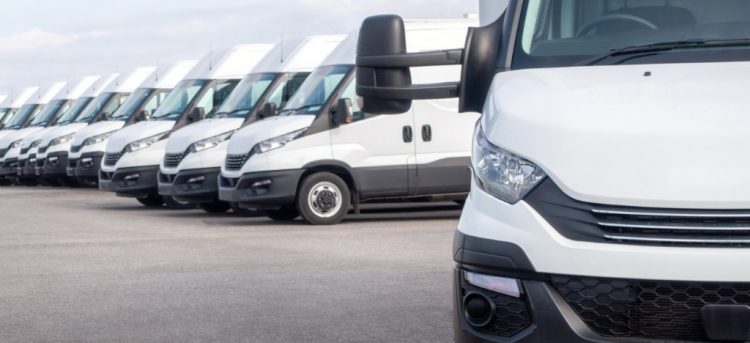If you have a business that needs vehicles to allow your workers to get around, deliver goods, or haul items, you’ve probably considered a commercial vehicle fleet. Construction crews, HVAC workers, landscapers, equipment dealers, solar panel installers, and general contractors all need specific vehicles to do their work. Whether you need to get goods to people or allow your workers to travel for work, a fleet of vehicles can be a major component of your business. Of course, buying any automobile is an expensive proposition, but a whole fleet of cars, box trucks, or commercial trucks is another story.
Depending on the size and type of the vehicle, you may need to ensure you have the right licensing and registration, which can be an additional cost. Fleet management is also a consideration, which includes vehicle maintenance, driver management, safety and legal compliance, and operational management. You may need special software or equipment, like GPS trackers, to make sure you have the best possible fleet management.
Luckily, just like with personal cars, there’s commercial fleet financing (CFF) available.
Equipment financing is generally straightforward for small businesses that need transportation equipment, commercial equipment, or construction equipment, as long as your business is in good standing. But there are many considerations that go into choosing how you’ll finance your fleet, and it’s worthwhile to do your research.
Depending on your line of business and specific business needs, you may need a variety of vehicles, a fleet of the same type of vehicles, or just one or two vehicles to deliver your services. You’ll also want to consider accounting issues like cash flow, your business credit score, and your overall likelihood of getting credit approval.
Read on to find out how you can get financing for a commercial vehicle fleet.
How Do You Finance a Car Fleet?
For business owners who need a car fleet, there are two ways to finance it: buy or lease. Buying means you pay for the fleet outright (generally with a loan) and own the equipment when you’ve paid it off. Leasing means the vehicle or fleet serves as collateral and you have the option to purchase it outright later.
Deciding whether to lease or buy depends on a number of factors. Leasing requires less capital up front, and your monthly payments will probably be lower. They’ll also be matched to the vehicle’s market value. Leasing also offers more flexible terms than buying, and can offer you more flexibility with your cash flow. You also have more control over standardization, and will have less age-related maintenance costs over time because you’re not responsible for the maintenance.
Buying a fleet can mean you have to handle selling or disposing of the vehicle fleet when you’re done with it. You’ll also have to be more careful with budgeting and forecasting in order to afford higher payments and the high initial cost. However, buying a fleet can help you establish equity and give you more options when it comes to vehicle variety.
Buying a Commercial Fleet
Unless your small business has a lot of cash on hand (and wants to tie it up in vehicles), buying means securing a loan, just as you would with a personal vehicle. But there are multiple pros and cons to consider. A trucking business loan, for instance, may not require cash collateral because the truck itself is the collateral. There may also be a longer repayment period than smaller loans, which may translate to an overall lower monthly payment, meaning this is less of a burden on your monthly cash flow. Equipment purchases like commercial vehicle fleets are also a tax write-off for your business, which can help you save on taxes.
However, this type of loan requires a large down payment, usually between 5-25% depending on your credit scores. And since there will be considerable depreciation on the vehicle or fleet over time, you may not make much off of reselling them.
As with personal vehicles, there are also financing options for pre-owned fleets or individual commercial vehicles. You have a good chance of finding a good-as-new fleet from former fleet owners who need to sell their equipment.
In addition to securing a loan, you may be able to find a commercial line of credit from a vehicle manufacturer or your bank so that you can use it to pay for new or updated vehicles and equipment over time.
Leasing a Commercial Fleet
Because buying a fleet can mean more capital upfront, many small businesses choose leasing a commercial fleet instead. This also frees up more capital for you to use to grow your business in other ways. You can also write off a lease on your taxes by deducting lease payments from your income statement for an operating lease or claiming depreciation for a capital lease.
For leasing, there are several options you may consider:
- Operating lease, which allows you to operate the vehicle or fleet without owning outright
- Capital lease, which allows you to use an asset on a rental basis, but shows up as ownership in accounting
- Sale-and-leaseback, where the owner would sell the vehicle or fleet and then pay the new owner to lease it
- Terminal Rental Adjustment Clause (TRAC) lease, which allows you to purchase the vehicle or fleet outright at the end of the lease
- Fair market value leasing, which allows you to upgrade to newer versions of equipment (generally for a heavy truck or semi truck)
Each of these leasing options comes with its own pros and cons, and the right lender can help you figure out which financing program is right for you and your business needs.
Commercial Truck Fleet Types
There are a number of different types of commercial truck fleets. Many vehicle fleets provide a service themselves, such as:
- Utility fleets, including water, electricity, and internet service providers (ISP)
- Delivery fleets for local deliveries from transit centers, like florists, food delivery, or Amazon and UPS
- Specialty vehicles like tow trucks, garbage trucks, street sweepers, and fire trucks
There are also vehicle fleets whose service is to a customer, such as:
- Rental vehicle fleets
- Passenger vans
- Buses
- Motor coaches
Commercial Trailer Fleet Types
A commercial trailer has to be pulled by a motor vehicle, and is intended for larger and longer transportation of goods. Long-haul delivery trailers, shipping companies, and large equipment companies will use a commercial trailer fleet. These may include box trucks or semi-trucks.
These fleets require special licenses to operate and registration from state to state. You’ll want to check with your state department of motor vehicles (DMV) to ensure you have the operating requirements covered.
How to Apply for Commercial Vehicle Fleet Financing
Applying for commercial vehicle fleet financing is similar to applying for other business financing or personal financing.
In order to apply for commercial vehicle fleet financing, follow these steps:
- Determine which vehicle or vehicles you want to purchase or lease and who you want to buy from
- Determine which lender is right for you and what offers you may qualify for
- Gather the required information and documentation
- Gather the down payment
- Get insurance
You can apply with many lenders and finance programs online, or in-person if you choose a more traditional bank.
Qualifications for Commercial Vehicle Fleet Financing
In order to qualify for commercial vehicle fleet financing, you’ll need to meet the specific requirements of your lender. While lender requirements vary, you should be prepared for the lender or lessor to consider any of the following:
- Your personal credit score
- Your business credit score
- Credit history
- How long you’ve been in business
- Annual revenue
- Experience in the industry
- Commercial drivers license (CDL), which may depend on your lender
In general, you should expect to make a down payment of 5-25%, again dependent on qualifications. Higher credit scores may also help your business qualify for better interest rates.
How Would Choosing New or Pre-Owned Affect Fleet Financing
As with personal vehicles, there are also financing options for pre-owned fleets or individual commercial vehicles. Depending on how specialized the equipment you use must be, you may have a good chance of finding a good-as-new fleet from former fleet owners who need to sell their equipment.
However, used equipment must be assigned a market value, and some lenders may not offer attractive financing options for older or very specialized vehicles.
New equipment may be financed by the original equipment manufacturer (OEM) and depending on how difficult it is for them to sell that equipment, they may offer incentives that make the terms quite attractive.
Do Fleet Loans Have Potential Tax Savings?
Leasing or buying commercial vehicles both offer potential tax benefits. Always check with your tax advisor to weigh the tax benefits of these options.
According to the IRS, “if the agreement is a lease, you may deduct the payments as rent. If the agreement is a conditional sales contract, you consider yourself as the outright purchaser of the equipment. You may generally recover the cost of such property used in a trade or business through depreciation deductions.”
When you lease a vehicle, you write off the expense either using the standard mileage rate (65.5 cents per mile for business use in 2023) or the actual expense method. Choose wisely; you can’t change methods once you’ve used one or the other.
When you buy a company vehicle, you may benefit from depreciation. For businesses that take depreciation, the Section 179 Deduction allows the business to accelerate the deduction of the purchase the year you place it in service, rather than over several years, up to certain limits.
For tax years beginning in 2023, the maximum section 179 expense deduction is $1,160,000 (total for all equipment eligible for the deduction, not per vehicle or piece of equipment). This limit is reduced by the amount by which the cost of section 179 property placed in service during the tax year exceeds $2,890,000.
However the maximum Section 179 expense deduction for sport utility vehicles placed in service in tax years beginning in 2023 is $28,900.
For 2022, the total section 179 deduction and depreciation you can deduct for a passenger automobile, including a truck or van, you use in your business and first placed in service in 2022 is $19,200, if the special depreciation allowance applies, or $11,200, if the special depreciation allowance does not apply.
Purchases of equipment above the limit ($1,160,000 in tax years beginning in 2023) may be eligible for bonus depreciation. Bonus depreciation is limited, though, depending on when the property is placed into service, and will eventually phase out for items placed in service in 2027 and later years unless Congress changes the tax code.
Bonus depreciation may be taken even if the business takes a loss, while the total amount you can deduct each year after you apply the dollar limit under Section 179 is limited to the taxable income from the active conduct of any trade or business during the year.
It’s important to note the section 179 deduction and the special depreciation allowance only applies to property used predominantly for business (more than 50%). If you use it less than 50% for business, you must use the straight-line depreciation method.
Business owners who lease or buy passenger vehicles need to be aware of additional limits that may affect the tax benefits available for expensive or luxury vehicles.
Again, this can be a complicated topic, so talk with your tax advisor about how to take advantage of commercial fleet vehicle tax benefits, and whether leasing or buying makes sense for your business from a tax perspective.
Commercial Fleet Financing Alternatives
If these options don’t work for your business, consider other alternatives:
Rent Vehicles
One alternative is to rent vehicles for short-term use (or sometimes even for long-term use). This will likely be a more expensive option but it can be helpful if other alternatives aren’t available, if the business only needs vehicles for a short period of time (say for a specific job), if the business only needs the vehicle for a short period of time, or if there is uncertainty about future needs.
Reimbursement
Companies may want to provide vehicles to executives or employees for any number of reasons, including as an employee benefit. Sometimes they choose to offer a company car allowance to the employee instead of purchasing a vehicle for that employee’s use.
Business Line of Credit
A business line of credit may be used to acquire vehicles quickly when the need or opportunity arises. For example, a competitor could go out of business and vehicles could become available at a great price, provided the purchaser can come up with cash quickly to buy them. Because the business is approved for a LOC ahead of time, it can tap those funds as needed without having to apply for a new loan.
Nav can help you find the right financing for your business. Connect your data to find lending options based on your qualifications. Get started now.
This article was originally written on April 14, 2022 and updated on August 19, 2023.



We are looking for a lending partner to floorplan our utility trucks and equipment for resale.
If you haven’t done so, you can get started with Nav to find financing options based on your qualifications.